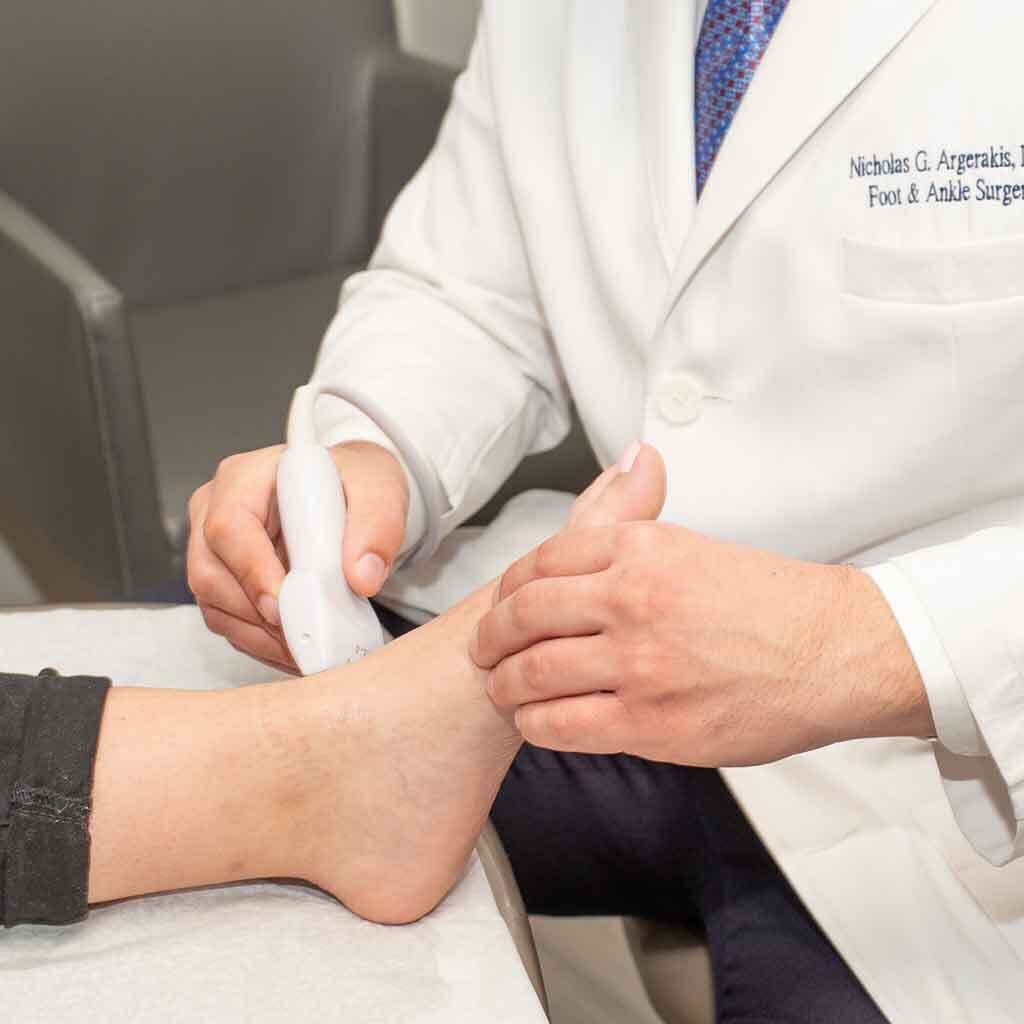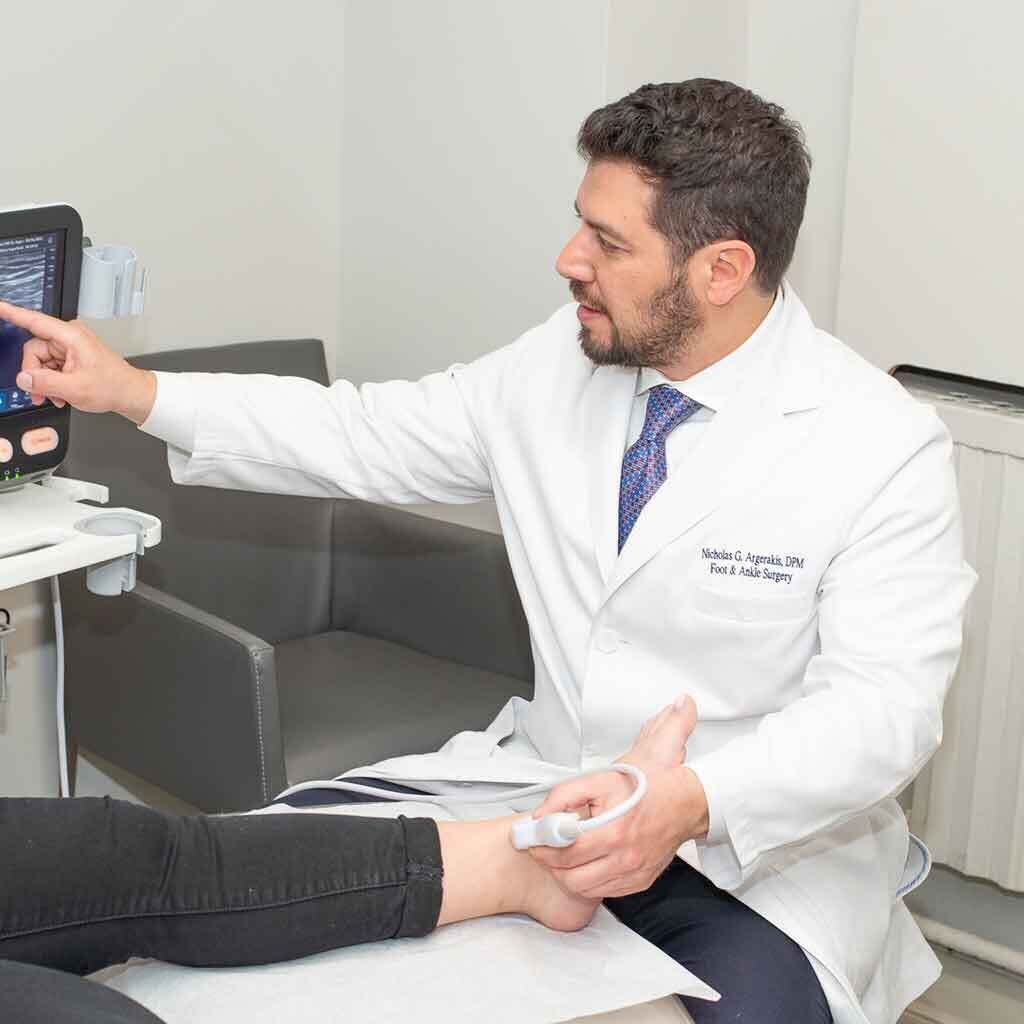Introduction
Foot reconstruction surgery, performed by Dr. Nick Argerakis, a board-certified foot and ankle surgeon, restores function, relieves pain and corrects deformities. With years of expertise, Dr. Argerakis offers long-term relief for foot conditions that affect mobility and quality of life.
Key Takeaways:
• Foot reconstruction surgery corrects structural deformities, relieves chronic pain, and restores mobility caused by injuries, congenital issues, or medical conditions like arthritis and diabetes.
• This procedure is recommended for individuals experiencing persistent pain, deformities such as flat feet or bunions, or complications from injuries that do not improve with non-surgical treatments.
• Techniques include bone realignment (osteotomy), tendon transfers, joint fusions (arthrodesis), and ligament repairs to stabilize and improve foot function.
• Patients may need to keep weight off the foot initially and use crutches or protective boots. Physical therapy is crucial for regaining strength, with full recovery taking several months to a year.
• While surgery is generally safe, potential risks include infection, nerve injury, or improper bone healing. Following post-operative care instructions helps minimize complications.
• New Jersey Foot Surgeons provide advanced surgical options, personalized treatment plans, and dedicated post-surgery care.
• Call (732)-320-9173 today to schedule a consultation and take the first step toward pain-free mobility.
What Is Foot Reconstruction Surgery?
Foot reconstruction surgery refers to a set of procedures aimed at correcting structural abnormalities in the foot and ankle. These abnormalities can result from congenital defects, injuries, arthritis, or other medical conditions. The primary objective of foot reconstruction surgery is to restore normal function, alleviate pain, and improve the foot’s appearance, enhancing the patient’s quality of life.

Why Consider Foot Reconstruction Surgery?
There are many reasons why individuals opt for foot reconstruction surgery. Chronic pain that does not respond to non-surgical treatments is a common motivator. Other reasons include deformities such as flat feet, high arches, bunions, or hammertoes, which can cause discomfort or mobility issues.
Injuries like severe fractures or tendon damage may also necessitate surgical intervention. Additionally, conditions such as arthritis or diabetes-related complications, like Charcot foot, can lead to significant foot deformities, requiring surgical correction.
Who Is a Candidate for Foot Reconstruction Surgery?
Candidates for foot reconstruction surgery are typically those who have not found relief through conservative treatments like orthotics, physical therapy, or medication. The decision to undergo surgery requires a thorough evaluation by a board-certified foot and ankle surgeon. Factors such as overall health, the severity of the condition, and the impact on daily life are taken into account to determine whether surgery is the best option.
Which Conditions Are Treated with Foot Reconstruction Surgery?
Foot reconstruction surgery addresses a wide range of conditions. Common issues include flat feet, where the foot lacks a proper arch, causing pain and mobility problems. Surgical options for flat feet include osteotomy, tendon transfer, or joint fusion to restore the arch. High arches, on the other hand, can lead to instability and discomfort. Procedures like tendon release or bone reshaping help balance the foot’s structure.
Bunions, a deformity characterized by a bony bump at the base of the big toe, are also frequently treated through surgical methods. Depending on the severity, the procedure may range from minimally invasive techniques to complex bone realignment.
Hammertoes, a condition where the toes bend downward, may require tendon release or joint fusion to straighten them. More complex issues like Charcot foot, often linked to diabetes, demand reconstructive surgery to stabilize the foot and prevent further deterioration.

Where Can You Undergo Foot Reconstruction Surgery in New Jersey?
New Jersey is home to several renowned clinics specializing in foot reconstruction surgery. Clinics like New Jersey Foot Surgeons offer advanced reconstructive procedures performed by skilled surgeons. The clinic provides personalized care, addressing a range of foot conditions using state-of-the-art facilities and innovative surgical techniques. Patients receive comprehensive support, from initial consultations to post-operative care, ensuring the best outcomes.
When Should You Consider Foot Reconstruction Surgery?
Foot reconstruction surgery should be considered when conservative treatments fail to alleviate pain or address deformities. If chronic foot issues affect your mobility or quality of life, surgical intervention may be necessary. Additionally, individuals experiencing progressive deformities that worsen over time should consult a specialist to explore surgical options.
How Is Foot Reconstruction Surgery Performed?
The techniques used in foot reconstruction surgery vary depending on the condition being treated. Common procedures include osteotomy, where bones are cut and realigned to correct deformities. Tendon transfer involves repositioning tendons to enhance support and function. Arthrodesis, or joint fusion, is performed to stabilize joints, while ligament repairs are conducted to restore stability to weakened areas.
The surgery is typically performed under anesthesia and may involve the use of minimally invasive or traditional surgical methods. A personalized approach ensures that the chosen procedure addresses the patient’s unique needs and provides optimal results.
What Is the Recovery Process Like?
Recovery from foot reconstruction surgery often requires a significant commitment. In the initial phase, patients are advised to keep weight off the foot using crutches or wearing a cast or protective boot. Physical therapy plays a vital role in regaining strength and mobility.
Depending on the complexity of the surgery, most patients can resume normal activities within a few months, but full recovery may take up to a year. Following post-operative instructions is crucial to achieve the best outcomes.
How to Prepare for Foot Reconstruction Surgery
Preparation for foot reconstruction surgery involves several steps. A comprehensive medical evaluation is essential to assess overall health and surgical suitability. Preoperative testing, such as blood tests and imaging studies, helps plan the procedure. Patients are advised to review their medications with their doctor, as some may need adjustments before surgery. Lifestyle changes, such as quitting smoking, are also recommended to promote optimal healing and recovery.
What Are the Risks and Complications?
Like any surgical procedure, foot reconstruction surgery comes with potential risks. These include infections, which can often be minimized through proper wound care, and blood clots, which may be prevented with early mobilization or blood-thinning medications. There is also a risk of nerve injury, although careful surgical techniques are used to protect nerve structures.
Other complications include non-union or malunion of bones, which may require additional interventions. A detailed discussion with your surgeon will help you understand the risks and the steps taken to mitigate them.
Why Choose Foot Reconstruction Surgery in New Jersey?
New Jersey offers access to experienced foot and ankle specialists, advanced medical facilities, and personalized care plans. Clinics like New Jersey Foot Surgeons are dedicated to helping patients achieve long-term relief from pain and deformities. With a focus on expertise, precision, and patient satisfaction, these clinics provide exceptional care from consultation to recovery.
If you’re considering foot reconstruction surgery, schedule a consultation today to explore your options. Call us at (732)-320-9173 to book an appointment and take the first step toward a pain-free life.


